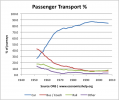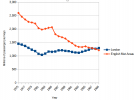Bletchleyite
Veteran Member
Only if one lives within a 10 minute walk of a major town centre like Altrincham or Macclesfield. It is not practicable if one lives 20 minutes walk away.
You've not come across bicycles before, then (or e-bikes)? A journey that would take 20-30 minutes to walk but can be cycled in 10-15 is pretty much the sweet spot for utility cycling - less than that and you might as well just walk by the time you've got your bike out of the shed and locked it up at the destination, more than that and it becomes a bit long/sweaty for most.
I'd say "but they prefer their Range Rovers down that way" - but cycling is also very popular among the middle classes these days.
Notably that's exactly the "sweet spot" my house to/from Bletchley station sits in - and that was a deliberate part of the choice of where to live!

Last edited by a moderator:


